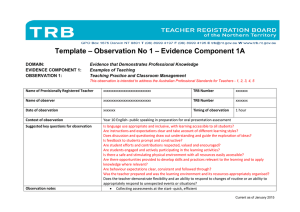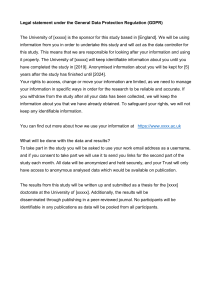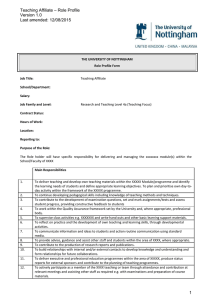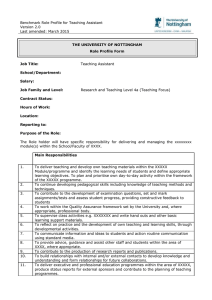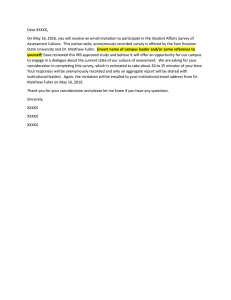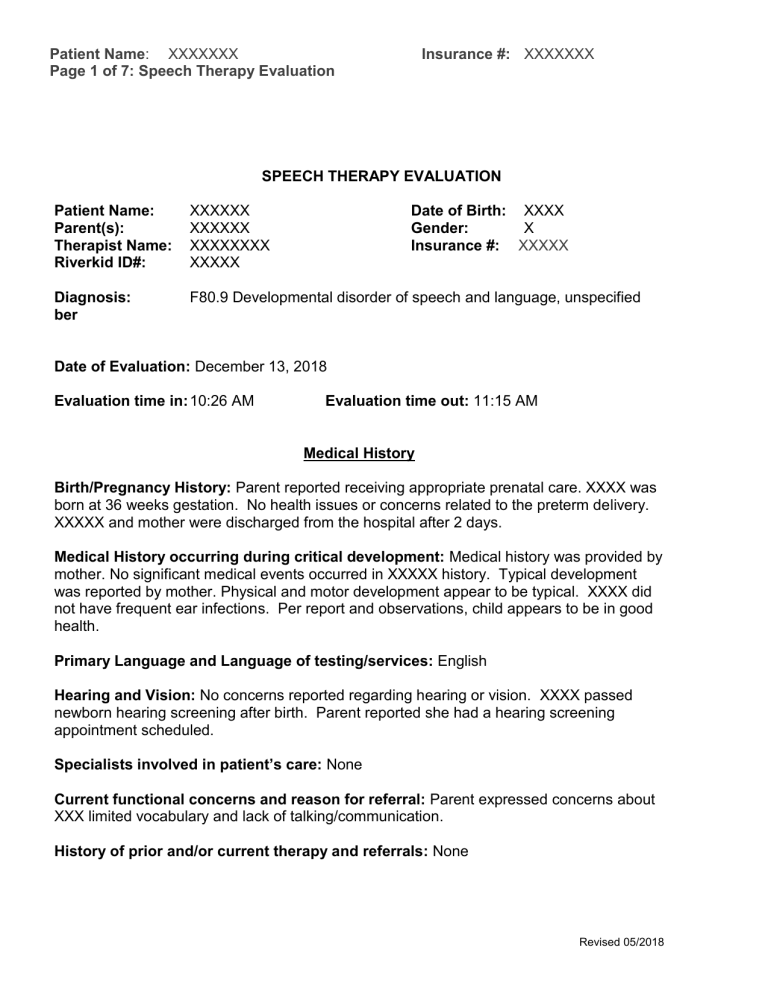
Patient Name : XXXXXXX
Page 1 of 7: Speech Therapy Evaluation
Insurance #: XXXXXXX
Patient Name:
Parent(s):
XXXXXX
XXXXXX
Therapist Name: XXXXXXXX
Riverkid ID#: XXXXX
SPEECH THERAPY EVALUATION
Date of Birth: XXXX
Gender: X
Insurance #: XXXXX
Diagnosis: ber
F80.9 Developmental disorder of speech and language, unspecified
Date of Evaluation: December 13, 2018
Evaluation time in: 10:26 AM Evaluation time out: 11:15 AM
Medical History
Birth/Pregnancy History: Parent reported receiving appropriate prenatal care. XXXX was born at 36 weeks gestation. No health issues or concerns related to the preterm delivery.
XXXXX and mother were discharged from the hospital after 2 days.
Medical History occurring during critical development: Medical history was provided by mother. No significant medical events occurred in XXXXX history. Typical development was reported by mother. Physical and motor development appear to be typical. XXXX did not have frequent ear infections. Per report and observations, child appears to be in good health.
Primary Language and Language of testing/services: English
Hearing and Vision: No concerns reported regarding hearing or vision. XXXX passed newborn hearing screening after birth. Parent reported she had a hearing screening appointment scheduled.
Speciali sts involved in patient’s care:
None
Current functional concerns and reason for referral: Parent expressed concerns about
XXX limited vocabulary and lack of talking/communication.
History of prior and/or current therapy and referrals: None
Revised 05/2018
Patient Name : XXXXXXX
Page 2 of 7: Speech Therapy Evaluation
Insurance #: XXXXXXX
Assessment Profile
Client’s Chronological Age at time of Evaluation:
2 years 1 month.
Tests Administered and Summary of Performance Profile on Standardized Testing:
The Preschool Language Scale - Fifth Edition (PLS-5 )
The Preschool Language Scale - Fifth Edition (PLS-5) is a developmental language assessment normed for ages birth-7:11. The PLS-5 assesses comprehension of basic vocabulary, concepts, and grammatical markers. It also asks children to name common objects, to use concepts that describe objects and express quantity, and to use specific grammatical markers and sentence structures.
Average standard scores are between 85-115. Percentile rank indicates the percentage of same-age peers the student scored as well as or better than (e.g. a percentile rank of 50% indicates the student scored as well as or better than 50% of same-age peers).
Test Results:
Subtest Standard
Score
Percentile Age-
Equivalent
Descriptive
Range
Auditory Comprehension 79 8 1-7 Moderate delay
Expressive Communication
Total Language
74
75
4
5
1-5
1-6
Moderate delay
Moderate delay
Auditory Comprehension Summary:
XXXX demonstrated auditory comprehension by: following familiar routines, following simple verbal commands with gestures, understanding of basic verbs, engaging in pretend play, and engaging in symbolic play.
XXXX did not demonstrate understanding of or knowledge of identifying common objects and pictures, to include body parts, clothing, actions in pictures and spatial concepts.
XXXXX standard score of 79 falls between 1 and 2 standard deviations below the norm and indicate that his receptive language skills are moderately below the average range as compared to same-age peers.
Expressive Communication Summary :
XXXXX demonstrated expressive communication skills by: using gestures, nonsense word vocalizations and joint attention.
XXXXX demonstrated a limited vocabulary. He appears to have 5 words in his expressive vocabulary and has a mean length of utterance of less than 1. Children XXXXX ’s age
Revised 05/2018
Patient Name : XXXXXXX
Page 3 of 7: Speech Therapy Evaluation
Insurance #: XXXXXXX should have a minimum of 50 words in their expressive vocabulary and a mean length of utterance of 2 words.
XXXXX
’s standard score of 74 fall between 1 and 2 standard deviations below the norm and indicate that his expressive language skills are moderately below the average range as compared to same-age peers.
Total Language Score Summary:
XXXXX ’s scores on the Auditory Comprehension and Expressive Communication subtests were combined and compared to same-age peers. XXXXX
’s Total Language Score of 78 is below the average range as compared to same-age peers.
Clinical Assessment
PAIN ASSESSMENT
No signs of pain were observed.
The following signs of pain were observed:
Precautions/Restrictions: Standard Precautions
Behavior/State(s)/General Observations related to testing performance: XXXXX was timid at first, but quickly engaged in activities. He demonstrated appropriate attention to tasks. No inappropriate behaviors were observed.
ACCESS TO ENVIRONMENT:
Equipment/Orthotics Owned: None
Anticipated Needs for Equipment: None
Environmental Considerations: XXXXX lives at home with his parents and 4 siblings.
The home is appropriate and adequate for therapy needs.
NUTRITIONAL RISK ASSESSMENT/CLINICAL FINDINGS
Warnings signs of poor nutritional health Yes No
Child has an illness or condition that requires modified solid or liquid textures that are not age appropriate or limit variety or adequate intake
Child has a limited food repertoire for inadequate nutritional variety inconsistent with age.
Child is <10% or >90% on the growth chart
X
X
X
Child vomits one or more times daily or has known history of gastroesophageal reflux
X
Revised 05/2018
Patient Name : XXXXXXX
Page 4 of 7: Speech Therapy Evaluation
Insurance #: XXXXXXX
Child has a known food allergy
Child often complains of stomach pains
X
Child exhibits avoidance behaviors or behavioral issues around novel foods and textures limiting intake or participation in meals.
Child remains at the table for only brief periods of time or requires inappropriately long amounts of time to complete a simple age appropriate meal
Child has lost or gained weight recently
X
X
X
Child has difficulty sucking and/or swallowing as evidenced by coughing, gagging, change in vocal quality or has been identified on Modified Barium
Swallow Study
Child has chronic constipation requiring use of laxative products
X
X
Child has diarrhea at least one time daily
X
Child >1 year refuses all solid foods orally (consumes only liquids)
If 3 or more of the above questions are YES, it may be an indication that this child is at high risk of compromise of adequate nutrition and/or hydration.
Action taken: Parents were advised and physician notified.
Clinical assessment of feeding and swallowing was conducted.
No further assessment indicated based on Risk Assessment.
SPEECH/LANGUAGE EVALUATION & CLINICAL FINDINGS
Receptive Language: WFL Mild Impairment Moderate Impairment Severe
Impairment
Not assessed due to:
Comments: XXXXX followed simple commands with gestures and demonstrated appropriate play skills; however, he demonstrated limited understanding of language concepts and vocabulary knowledge.
Expressive Language: WFL Mild Impairment Moderate Impairment Severe
Impairment
Not assessed due to:
Comments: XXXXX has an MLU of less than 1; he has a severely limited expressive vocabulary and limited communication skills.
Articulation: WFL Mild Impairment Moderate Impairment Severe Impairment
Not assessed due to: no verbal communication skills
Comments:
X
X
Revised 05/2018
Patient Name : XXXXXXX
Page 5 of 7: Speech Therapy Evaluation
Insurance #: XXXXXXX
Oral motor skills related to Speech Production: WFL Mild Impairment Moderate
Impairment Severe Impairment
Not assessed due to:
Comments: XXXXX shows no signs of weakness or lack of coordination/range of motion with oral motor skills.
Voice: WFL Mild Impairment Moderate Impairment Severe Impairment
Not assessed due to:
Comments: Vocalizations demonstrated had appropriate quality and volume.
Fluency: WFL Mild Impairment Moderate Impairment Severe Impairment
Not assessed due to: no verbal communication skills
Comments:
Pragmatics: WFL Mild Impairment Moderate Impairment Severe Impairment
Not assessed due to:
Comments: Limited use of pragmatic skills to include requesting, comments, seeking assistance appropriately. XXXXX did demonstrate appropriate turn taking skills and play skills.
Attention: WFL Mild Impairment Moderate Impairment Severe Impairment
Not assessed due to:
Comments: XXXXX attended to tasks and activities with minimal redirections.
Hearing:
WFL Mild Impairment Moderate Impairment Severe Impairment
Comments: No concerns were reported or observed
Vision:
WFL Mild Impairment Moderate Impairment Severe Impairment
Comments: No concerns were reported or observed
CLINICAL ASSESSMENT SUMMARY:
Summary from clinical testing: XXXXX is a 2 year 1 month old male who presents with language test scores and abilities significantly below those expected for a child of his chronological age. These deficits interfere with his ability to effectively communicate his wants and needs consistently with parents and caregivers. As a result, he qualifies for skilled speech therapy services in the area of language. Skilled therapy services targeting language and communication skills development are recommended.
Family Goals / Areas of Concern: XXXXX
’s mother expressed concerns regarding poor communication skills and limited talking. She would like XXXXX to be able to express himself effectively using words.
Revised 05/2018
Patient Name : XXXXXXX
Page 6 of 7: Speech Therapy Evaluation
Insurance #: XXXXXXX
Medical Necessity: XXXXX Gonzalez will benefit from Speech Therapy in the home to meet emergency, personal care and/or safety needs by addressing the identified functional impairments.
Plan of Care Recommended for Initial Episode of Care:
Long-Term Goals have been established, as discharge criteria for the dates requested for this episode of care:
Short Term Goals and Functional Improvement Outcomes expected ( Short term goals are addressed to meet Long
Term Goals for the dates requested for this episode of care):
1. XXXXX will demonstrate appropriate language skills within the home setting in 50% of communication opportunities.
Baseline Status: 5%
1. XXXXX will demonstrate ability to use language for a variety of functions (comment, protest, request, label, answer questions) in 75% of opportunities when provided with min to mod verbal cues.
Baseline status: 10%
2. XXXXX will demonstrate ability to label common vocabulary with 80% accuracy when provided with visual cues
(pictures and objects)
Baseline status: 0%
3. XXXXX will demonstrate an increase in mean length of utterance from 0 to 1-2 words in 75% of opportunities when provided with min- mod verbal cues.
Baseline status: 0%
4. In order to carryover and stabilize new skills, parent will demonstrate carryover by completing home program activities
75% of the time
Baseline status:0%
2. Caregiver will be independent with home program to facilitate
XXXXX
’s language development via daily home activities with 75% accuracy.
Baseline Status: 0%
Skilled Treatment Plan (specific interventions) to be included but not limited to:
Naturalistic approaches including: providing distributed learning opportunities, following the child’s focus of attention or interest for reinforcement, using antecedent and consequent stimuli naturally associated with a particular communication response.
Family and/or primary caregiver’s expected role in client’s treatment :
Therapist explained the expectation of a home program with XXXXX ’s mother. The therapist will provide suggestions, activities or strategies to be used by family/caregivers in the home setting outside of therapy sessions. These activities are designed to increase
Revised 05/2018
Patient Name : XXXXXXX
Page 7 of 7: Speech Therapy Evaluation
Insurance #: XXXXXXX acquisition and carryover of newly learned skills from therapy sessions to the home setting.
Mother indicated agreement with the plan of care and had no questions.
Potential for improved functional outcomes as listed above are Excellent Good
Fair Poor with skilled speech therapy intervention and regular modification or updates to home program and education to promote progress and carryover.
Skilled Speech Therapy services are recommended at a frequency of 2 times per week for a duration of 6 months to address the care plan based on the following criteria: moderate delay in receptive and expressive language skills.
Revised 05/2018
